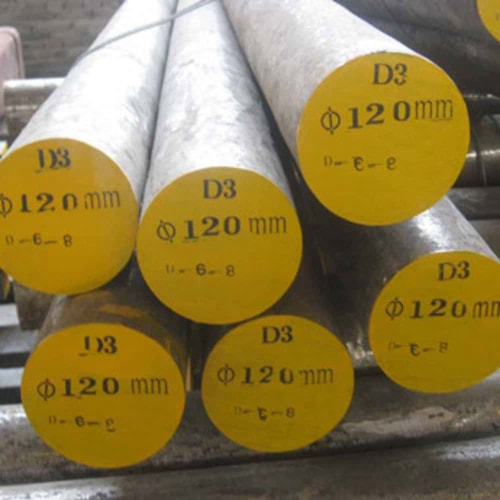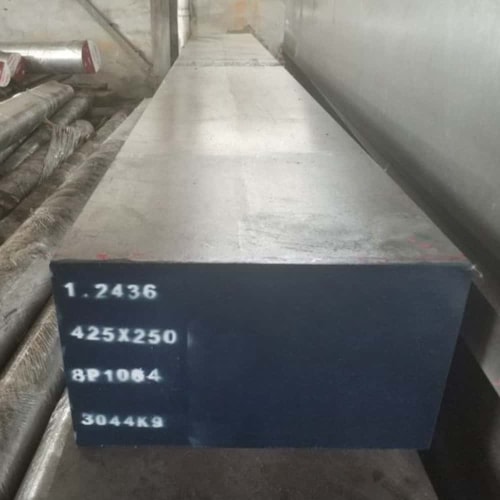D2/1.2379 Tool Steel

D2/1.2379 Tool Steel
D2 steel, also known by its European designation 1.2379, is a high-carbon, high-chromium tool steel known for its excellent wear resistance, toughness, and ability to retain a sharp edge under tough conditions. It is classified as a cold work tool steel, making it ideal for tooling applications that require high durability and precision.
D2 (1.2379) steel is a versatile and reliable material for tools and dies that require exceptional durability and wear resistance. It is an excellent choice for manufacturers in industries such as automotive, aerospace, and tooling, where precision and longevity are crucial.
Product Parameter Table
Chemical composition :
|
Element |
D2 |
1.2379 |
|
C |
1.4-1.6 |
1.45-1.6 |
|
Si |
0.1-0.6 |
0.2-0.6 |
|
Mn |
0.1-0.6 |
0.03max |
|
S |
0.03max |
0.03max |
|
P |
0.03max |
0.1-0.6 |
|
Cr |
11.0-13.0 |
11.0-13.0 |
|
Mo |
0.70-1.2 |
0.70-1.0 |
|
V |
0.50-1.10 |
0.70-1.0 |
Mechanical properties :
|
Tensile Strength Mpa |
Yield Strength Mpa |
Elongation % |
Reduction Area Z(%) |
Charpy Impact |
|
≥2000 MPa |
≥1800 MPa |
11% |
12% |
24 J |
Round steel:
Rolling size range: 10-260mm
Forging size range: 70-800mm
Square steel:
Thickness size range: 10-500mm, width size range: 200-810mm
Forged rings:
Outer diameter size can reach up to 1000mm
Application
1. Cutting Tools
Blades and Knives: D2 is widely used for manufacturing industrial blades and knives due to its excellent edge retention and wear resistance, particularly in high-stress cutting applications.
Shears and Slitting Tools: The steel’s ability to maintain sharpness makes it ideal for use in shears, slitting knives, and other cutting tools in industries like metalworking and paper processing.
2. Molds and Dies
Injection Molds: D2 is often used for making injection molds, especially for plastic molding applications. Its hardness and wear resistance ensure long-lasting performance during high-volume production.
Die Casting Tools: D2’s toughness and resistance to deformation make it a popular choice for die casting applications, particularly in high-pressure environments.
3. Stamping Dies
Forming Tools: In stamping and forming operations, D2 is used for dies that must endure high levels of stress and abrasion, including those in the automotive and aerospace industries. Its strength and wear resistance contribute to extended tool life and consistent performance.
4. Punches and Dies
Piercing and Blanking Tools: D2 is commonly used for punches and blanking dies, especially in applications requiring high precision and durability. Its resistance to wear ensures the tools can withstand the stresses of repetitive impact.
5. Extrusion Dies
Extrusion Molds: Due to its ability to resist abrasive wear and maintain sharpness, D2 is used in extrusion dies, which are critical in forming materials such as plastics, metals, and other materials under high pressure.
6. Woodworking Tools
Planer Blades and Router Bits: D2 is also used in the production of woodworking tools, including planer blades, router bits, and saw blades. Its edge retention and hardness are highly beneficial for cutting through tough wood and other materials.
7. Knives for Food Processing
Industrial Food Slicing: In the food processing industry, D2 is used to make knives for slicing, dicing, and cutting tough foods like meat and vegetables. The steel’s wear resistance and toughness make it ideal for long-lasting performance in high-volume processing environments.
8. Forming and Bending Tools
Cold Work Tools: D2 is employed in cold working tools such as bending dies, drawing dies, and forming tools for metals and other materials. Its ability to resist wear and maintain its shape under pressure is crucial in these applications.
9. Aerospace and Automotive Tools
Precision Dies and Parts: In the aerospace and automotive industries, D2 is used for precision dies and parts that need to maintain high performance under demanding conditions, including high temperatures, pressures, and abrasions.
Customer Testimonials
Good Toughness and Impact Resistance
Despite its high hardness, D2/1.2379 steel exhibits good toughness and impact resistance. This is particularly important for our tools that are subjected to high impact forces during operation. The steel’s ability to withstand such forces without cracking or deforming has significantly improved the reliability and durability of our products, making them suitable for demanding applications.
Low Distortion and High-Quality Surface Finish
One of the key advantages of D2/1.2379 steel is its low distortion during heat treatment. This ensures that our tools and molds maintain a high-quality surface finish, which is essential for producing precision parts. The minimal distortion also means that we can achieve tighter tolerances in our manufacturing processes, leading to higher quality and more consistent products.
Versatility in Applications
D2/1.2379 steel’s versatility is a major plus. It is suitable for a wide range of applications, from cutting tools and stamping dies to cold work molds and thread rolling dies. Its high wear resistance and good toughness make it an ideal choice for long-run tooling applications where precision and durability are critical. This has allowed us to use a single material for multiple applications, simplifying our material management and procurement processes.





